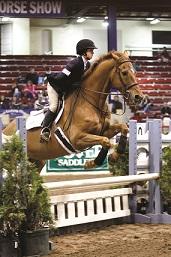
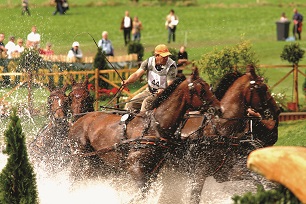
In 2015, the world of horses will turn its eyes toward America as Las Vegas once again welcomes the International Equestrian Federation (FEI) World Cup Finals show jumping and dressage championships, an event that has been held in European countries since 2009. Vegas is a favorite home of equestrian and rodeo events, hosting FEI World Cup finals in one or both of the Olympic equestrian disciplines on six previous occasions. The 2015 FEI World Cup Finals will call the Thomas & Mack Center at UNLV home, a venue that has deep equestrian and rodeo credentials: home to the Professional Rodeo Cowboys Association’s (PRCA) National Finals Rodeo, the Professional Bull Riders Association, as well as previous FEI World Cup events.
More Than One Way to Ride
The FEI considers competitions the lifeblood of equestrian sports, serving as the principal goal for all of the hard training required of athletes and their horses. As a result, the international governing body has recently introduced a streamlined bidding process for its FEI Games, Championships and Finals events. The American equestrian national governing body, the United States Equestrian Federation (USEF) also supports the growth and viability of equestrian sports by providing several levels of membership, from senior competing athletes to farm members.
Rodeo, a distinctly American branch of equestrian competition borne of the skills necessary for working cattle ranches, is governed by several organizations, the largest of which is the PRCA. The PRCA sanctions about 600 rodeos, which are typically homegrown events, created by local committees and held at local facilities.
“The sanctioning process usually begins when the PRCA’s rodeo administration department is contacted by a community that consists of organizers wanting to hold a rodeo in their town,” says Sherry Compton, media department manager, PRCA. “After meeting certain criteria for approval, local rodeo committees organize the PRCA-sanctioned rodeos held across the continent.”
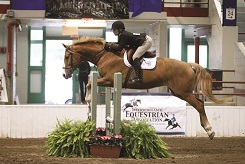
Equestrian and rodeo events vary greatly depending on the particular disciplines being competed, the number of horses and riders, and the age and experience of the athletes. A few key venue attributes, however, remain crucial for all kinds of equestrian and rodeo events. Just ask Tim Lynch. Lynch is currently the general manager of Queen Creek, Arizona’s Horseshoe Park. He also spent eight years as general manager at Hardy Murphy Coliseum in Ardmore, Oklahoma, following a career as a horse trainer and showman specializing in reining horses. He earned five world titles and coached eight non-professional riders to national and world titles. In short, he knows equestrian events and the venues that host them.
“Preparing the ground is the primary function of a facility,” says Lynch. “Every trainer who comes in to show at your arena could very possibly be one win away from keeping a client and one client away from keeping his pickup truck. It’s very important that every horse can be displayed at its very, very best, and so we need to provide them with the right kind of treading, every time, all the time.”
When it comes time to go venue shopping, event owners often have their own specific list of must-haves for facilities and destinations. Roxane Lawrence is the executive director of the Interscholastic Equestrian Association (IEA).
“Our organization provides opportunities for young people from middle income families to participate in equestrian events, and we stepped into the market at just the right time,” says Lawrence. “We began with 200 members in 2002, and we’re projecting reaching 10,000 members this year.”
Because the IEA serves young athletes rather than circuit-riding rodeo and equestrian athletes, its facility needs are unique.
“Unlike the big, high-end shows, the things we look for are a bit different,” says Lawrence. “We have to have a large seating capacity first of all. Our riders don’t just travel with their horse and trainer. They bring mom, dad, grandma and the family dog, so we typically estimate that we need four seats for every rider. We also need a variety and abundance of concessions.”
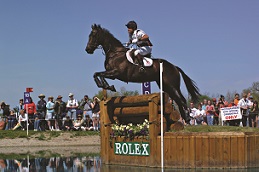
“The Oklahoma State Fairgrounds is a wonderful facility: lots of seating and air conditioning everywhere you compete,” says Lawrence. “That can be incredibly important, especially in June.”
Arenas Across America
Equestrian events can be expensive both for athletes and event owners, and the economic downturn has affected the industry. But today, growth is the sport’s key trend, and the sport is changing as well as expanding.
Beth Himes is the president of the National Reining Horse Association (NRHA), a nonprofit association that promotes and supports reining, an event that demonstrates the athletic ability of a ranch-type horse within the confines of a show arena.
“Many of our affiliates are hosting entry-level reining classes at a local level and seeing much success. These entry-level options, plus youth, affiliate and NRHA Professionals programs make it easy for people to get started in the sport,” explains Himes. “What we're seeing is that people are choosing a select group of shows to compete in, but they're showing more when they're there. Shows that have a welcoming atmosphere, quality facilities, reasonable fees and quality purses will thrive.”
As equestrian and rodeo events grow, facilities from West to East are growing too, expanding and improving all the time. Each can attribute its success to something different.
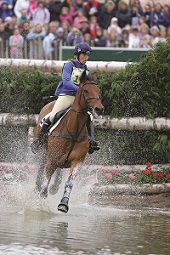
The Prince George's Equestrian Center and Show Place Arena in Upper Marlboro is a sports and entertainment facility offering more than 49,000 square feet of space, numerous tracks, a schooling ring and stabling areas for more than 200 horses. Among their higher-profile events are the Bill Pickett Rodeo and the Capital Challenge Horse Show.
“Our location next to the nation’s capital makes our equestrian community a natural host for these kind of events,” says J. Matthew Neitzey, executive director, Prince George’s County Convention and Visitors Bureau.
Alpharetta, Georgia
Located on 50 acres of fields and woods, Alpharetta’s Wills Park Equestrian Center can attribute its unique success to a variety of facilities. The center offers eight shed row type barns with covered aisles and 298 stalls. The facility includes a covered ring, 150 by 350 feet, and two uncovered rings with all weather footing, each measuring 125 by 225 feet.
Currently the facility has a full calendar of local and regional events. “We’ve got the whole year booked, the first event in January and going until the end of December,” says Adam Berrios, sports sales manager, Alpharetta Convention and Visitors Bureau. “One of the organizations we partner with is Horse Show Ventures. They’ve got five events on different weekends throughout the year.”
Look for larger events to flock to Alpharetta’s horse country in the near future though. The city is in the process of redeveloping its master plan, and Wills Park Equestrian Center is one of several facilities being considered for upgrades.
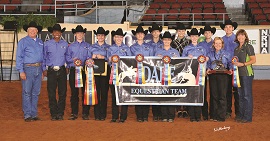
In 2009, with a $935,000 grant from the National Park Service’s Land & Water Conservation Fund, the Town of Queen Creek transformed a former landfill into an equestrian facility—Horseshoe Park— with four arenas and extensive amenities. In the last year, they’ve upped the ante even more.
“We resurfaced all of our arenas, which is an expensive proposition, but you’ve got to be able to have your ground match every single discipline,” says general manager Lynch. “We’ve added 200 stalls, bringing us to 300, put in 40 RV bays with 50 amp service and water, added to the cattle pens on the east side and added new pens on the west side.”
Lynch also believes in ensuring that his people train with the best, sending two of his top operators to work with Kiser Arena Specialists as they installed and maintained for two of the sport’s biggest championships. “We’ve put time, money and effort into developing our staff,” says Lynch. “That’s important to us.”
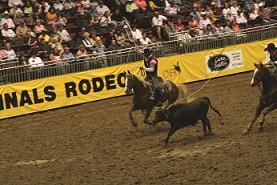
Sometimes, success can be attained just by recognizing your roots. The center of collegiate rodeo for more than a decade, Casper just cemented its place in the college rodeo world by extending its contract with the NIRA until 2022.
“The College National Finals Rodeo has been called the Rose Bowl of rodeo,” says Aaron McCreight, CEO, Casper Area Convention and Visitors Bureau. “It’s a fabulously successful event, and our attendance continues to grow. We set an attendance record in June 2012, and then surpassed it this year.”
The event, which is held at the multipurpose Casper Events Center, draws upwards of 400 contestants from around the nation for a weeklong event. Casper’s Central Wyoming Fairgrounds also hosts three rodeos each year in its indoor and outdoor facilities.
“Rodeo is the state sport in Wyoming,” says McCreight. “Actually, it’s not a sport. It’s a way of life.”
Lexington, Kentucky
“We’re very blessed as the horse capital of the world,” says John Pohl, director of sports and equine sales, Lexington Convention and Visitors Bureau. “A lot of places have more horses and possibly more prestigious events, but probably no city is surrounded by over 450 horse farms and many of the equestrian world’s key organizations.”
Kentucky Horse Park is Lexington’s premier equestrian facility, which includes the indoor Alltech Arena, outdoor Rolex Stadium and an additional covered arena, as well a numerous equine attractions and museums.
“Kentucky Horse Park is basically Disneyland for people who have an interest in the equestrian world,” says Pohl. “The new Alltech Arena was built for the World Equestrian Games, which we hosted in 2010, the first time that event was hosted outside of Europe.”
The Rolex Stadium is home to another leading equestrian event, the Rolex Kentucky Three Day Event, which challenges horse and rider partnerships with three consecutive events: dressage, cross-country and jumping.
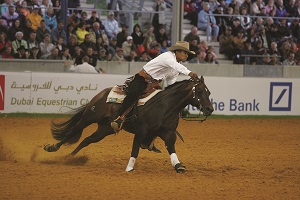
Less than an hour north of Houston, Conroe, Texas, is home, in true Texas fashion to its own annual rodeo, the Montgomery Country Fair and Rodeo, which happens each spring. That’s not where equestrian events end in this small town in the Piney Woods, though. Conroe is also home to the Showmanship Clinic Texas AgriLife Extension and the Open Show Gulf Coast Arabian Horse Club.
Conroe’s equestrian venue is the Lone Star Convention and Expo Center, which includes an 82,500-square-foot equestrian facility, including 200 stalls, a covered warm-up arena, and an outdoor warm-up arena between the Equestrian Center and the Expo Center.
Ocala/Marion County, Florida
Anchored by the Florida thoroughbred breeding and training farms with more than 70,000 acres, Ocala/Marion County’s horse industry is represented by virtually every breed of horse. In fact, the county has the highest number of horses and ponies in residence in America, as well as some exceptional equestrian facilities. The Florida Horse Park is an ideal example.
“We are in the process of building a covered arena, and once completed, the plans are to invite the western disciplines of rodeo and reining to the park,” says Ellen Ettenger, event director, Florida Horse Park. The park regularly hosts three-day eventing, dressage and combined driving events on courses were designed by world-class, international course designers, allowing spectators not only to get to see what the highest echelon of these events can offer, but also attracting Olympians and international competitors.

